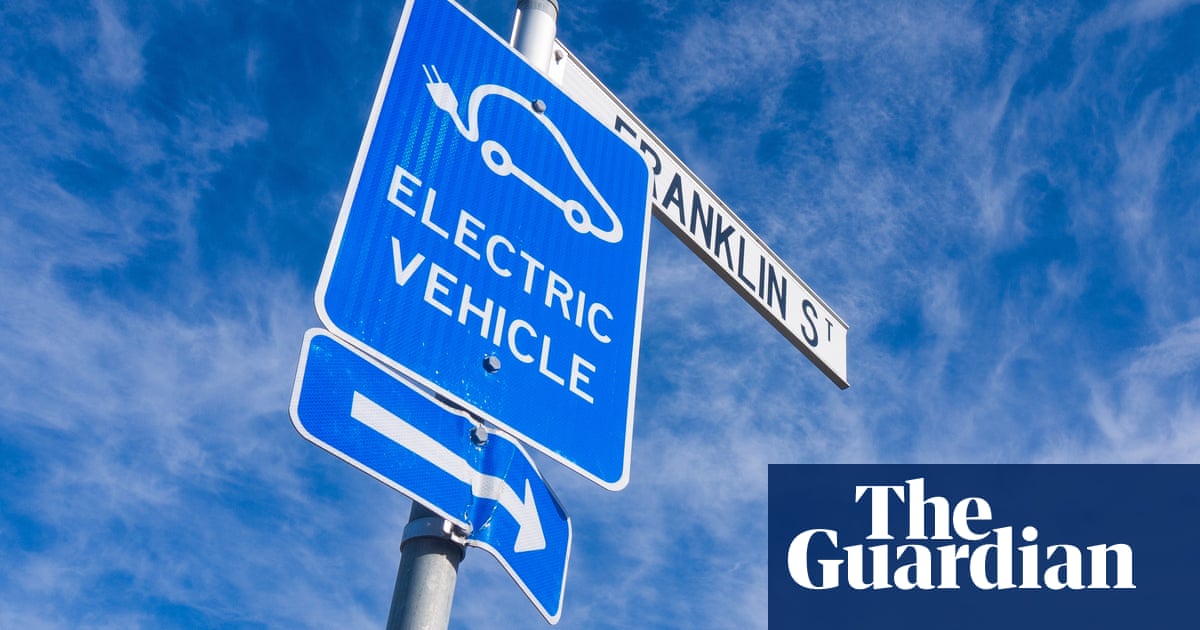
The Albanese government will impose a fuel efficiency standard on new cars and encourage electric vehicle uptake in an attempt to cut 3m tonnes of carbon emissions by 2030.
But despite numerous previous reviews, the government’s latest strategy does not include any new targets for EV uptake or what the fuel efficiency standard should look like, with specifics to be decided over the next year through another consultation process.
The climate change and energy minister, Chris Bowen, said on Wednesday the government’s EV policy would “provide greater choice for Australians to drive cars that are cleaner and cheaper to run”. He said Russia and Australia were the only two developed nations in the world without fuel efficiency standards, which meant car manufacturers were incentivised to send higher-polluting vehicles to Australia because they could not be sold elsewhere.
“Fuel efficiency standards would require more affordable electric vehicles to be sent to Australia,” Bowen told a Canberra press conference.
“In other countries there’s a much bigger range of electric vehicles available for people. We want people of all walks of life, regardless of their income, to have the chance to consider buying an electric vehicle.”
He said car company executives had told him they could not convince their global boards to send more fuel efficient vehicles to Australia.
The fuel efficiency standard is yet to be designed in consultation with industry, but the government points to studies that suggest a standard on how much carbon dioxide cars can emit could save motorists $519 a year in fuel costs.
On average, new cars in Australia use 40% more fuel than in the European Union, 20% more than the United States, and 15% more than New Zealand.
EVs are now just 3.8% of new car sales in Australia compared with 9% globally. The EV strategy aims to reduce barriers to uptake, including improving charging infrastructure.
However, the transport minister, Catherine King, acknowledged that while the fuel efficiency standards would be mandatory for new cars, the strategy released on Wednesday did not include details on when they would come into operation.
“It is literally a consultation paper that needs to look at, what are the C02 standards? What is the timing of this? What is the trajectory, to go hard fast or do you slowly build up? What are the credits and debits included in that?” King said.
Bowen also suggested the government would not set a target for EV uptake, instead changing settings so consumers had “better options”.
The policy contains no new incentives to buy EVs, instead promising to work with states and territories for a “nationally consistent principles to guide further incentives to support sustained demand across the nation over time”.
The consultation will run for six weeks. King said she hoped to have an exposure draft for updated legislation, and potentially introduce the bill to parliament, by the end of the year.
Bowen said the fuel efficiency standards “don’t have a budgetary impact”. The plan announced on Wednesday does not include extra funding for EV infrastructure or to incentivise uptake. But Bowen noted the government’s existing commitments to build fast-charging stations through its $500m “driving the nation fund”, and previous moves to cut taxes on such vehicles.
The government will develop a “national mapping tool to support optimal investment in … EV charging infrastructure” and provide guidance to people living in apartments about purchase and ownership of EVs, according to the strategy document.
after newsletter promotion
The government will also create “a recycling, reuse and stewardship initiative for EV and other large format batteries”.
The policy suggests the government will need to develop national standards on charging infrastructure and should consider acoustic vehicle alerting systems “to reduce potential pedestrian collisions”, particularly for blind or low vision pedestrians.
The commonwealth also has a target of 75% low-emissions vehicles for fleet new passenger vehicle purchases and leases by 2025.
The strategy suggests the commonwealth work with New Zealand, states and territories to “aggregate government fleet vehicle purchasing and consider opportunities beyond light vehicles, such as buses”.
Asked about the Commonwealth’s challenge to a Victorian state government plan to level road user charges on EVs, to offset tax losses through fuel excise, Bowen said: “We think more modelling and work needs to be done on implications and we’ll continue to do that.”
Passenger vehicles contribute 60% of Australia’s transport emissions and more than 10% of total emissions. The policy aims to cut emissions by at least 3m tonnes of carbon by 2030, and more than 10m tonnes to 2035: which is less than 1% of national emissions.
Bowen said: “Fuel-efficient and electric vehicles are cleaner and cheaper to run – today’s announcement is a win-win for motorists.
“The government has already cut taxes on EVs through the electric car discount, saving up to $11,000 a year on a $50,000 electric vehicle.”
King said a fuel efficiency standard would “send a strong message to the global car industry that when it comes to transport technology, Australia will no longer settle for less”.
“More than 85% of all cars sold in the world are subject to fuel efficiency standards. It’s time Australians were offered the same choice.”
"strategy" - Google News
April 19, 2023 at 05:50AM
https://ift.tt/eIvOsaY
Labor’s electric vehicle strategy promises new fuel efficiency standard and battery recycling - The Guardian
"strategy" - Google News
https://ift.tt/xW2df0R
https://ift.tt/onduFbx
Bagikan Berita Ini














0 Response to "Labor’s electric vehicle strategy promises new fuel efficiency standard and battery recycling - The Guardian"
Post a Comment